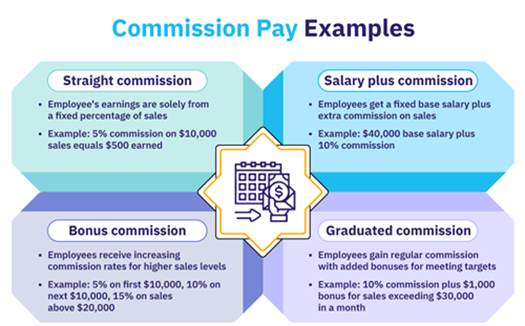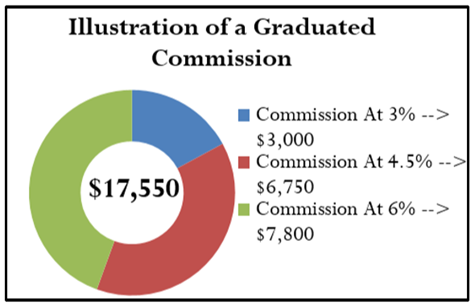Section 1-7: Graduated Commission
Section 1-7: Graduated Commission
Overview

 Graduated commission, also known as tiered commission, is a commission structure where the commission rate increases as the sales volume or performance reaches certain thresholds or tiers. It's a way to incentivize higher levels of performance by rewarding employees with higher commission rates as they achieve higher sales targets.
Graduated commission, also known as tiered commission, is a commission structure where the commission rate increases as the sales volume or performance reaches certain thresholds or tiers. It's a way to incentivize higher levels of performance by rewarding employees with higher commission rates as they achieve higher sales targets.
Key points about graduated commission include:
Tiered Structure: Graduated commission structures typically have multiple tiers or levels, each with its own commission rate. As sales volume increases and reaches predefined thresholds, the commission rate for subsequent sales may increase.
Increasing Incentive: Graduated commission structures provide increasing incentives for sales professionals to exceed sales targets and achieve higher levels of performance. The prospect of earning higher commission rates motivates employees to strive for higher sales volumes.
Thresholds and Rates: The specific thresholds and commission rates in a graduated commission structure vary depending on company policies, industry standards, and individual sales goals. Higher tiers often have higher thresholds and commission rates.
Example: For example, a graduated commission structure might have the following tiers:
- Tier 1: Sales up to $10,000 earn a 5% commission rate.
- Tier 2: Sales between $10,001 and $20,000 earn a 7% commission rate.
- Tier 3: Sales above $20,000 earn a 10% commission rate.
Advantages: Graduated commission structures provide a clear incentive for sales professionals to increase their sales volume and achieve higher performance levels. They reward top performers with higher commission rates, encouraging continued growth and productivity.
Complexity: Managing a graduated commission structure may require careful tracking of sales performance and commission calculations to ensure accuracy and fairness. Employers need to clearly communicate the structure and criteria to employees to avoid misunderstandings.
Graduated commission structures can be effective tools for motivating and rewarding sales professionals, as they provide clear incentives for achieving higher sales targets and performance levels. By offering increasing commission rates as sales volume grows, companies can encourage employees to maximize their sales potential and drive revenue growth.
Online Textbook Read Section 1-7: (Graduated Commission)
What is Graduated Commission?
Overview

 Definition: Graduated commission, also known as tiered commission, is a type of commission structure where the commission rate increases as sales volume or performance reaches certain thresholds or tiers.
Definition: Graduated commission, also known as tiered commission, is a type of commission structure where the commission rate increases as sales volume or performance reaches certain thresholds or tiers.
Key Components:
Tiered Structure:
- Graduated commission structures consist of multiple tiers or levels.
- Each tier has its own commission rate, which applies to sales within that tier.
Increasing Incentive:
- As sales volume or performance surpasses predefined thresholds, the commission rate for subsequent sales increases.
- Higher tiers offer higher commission rates, providing increasing incentives for sales professionals to achieve higher sales targets.
Thresholds and Rates:
- Specific thresholds and commission rates vary depending on company policies and sales goals.
- Thresholds represent sales volume targets that, once achieved, trigger a higher commission rate for subsequent sales.
- Commission rates at higher tiers are typically higher to reward top performers and encourage continued growth.
Example: Let's illustrate with an example of a graduated commission structure:
- Tier 1: Sales up to $10,000 earn a 5% commission rate.
- Tier 2: Sales between $10,001 and $20,000 earn a 7% commission rate.
- Tier 3: Sales above $20,000 earn a 10% commission rate.
In this example, sales professionals earn a 5% commission rate on sales up to $10,000. Once they surpass $10,000 in sales, they move to Tier 2 and earn a higher commission rate of 7% on sales between $10,001 and $20,000. If they exceed $20,000 in sales, they move to Tier 3 and earn a 10% commission rate on all sales above $20,000.
Advantages:
- Graduated commission structures provide clear incentives for sales professionals to achieve higher sales targets.
- They reward top performers with higher commission rates, motivating employees to strive for higher sales volumes.
- By offering increasing commission rates as sales volume grows, companies can encourage employees to maximize their sales potential and drive revenue growth.
Overall, graduated commission structures are effective tools for incentivizing sales performance and aligning the interests of sales professionals with those of the company. They provide a structured approach to rewarding achievement and driving sales growth.
Videos (Click on Image to View Videos)
